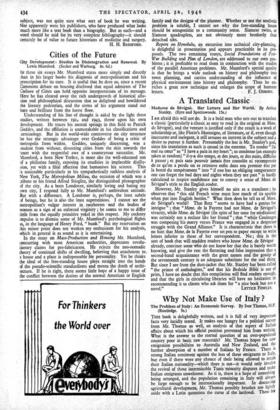A Translated Classic
Madame de Sevigne. Her Letters and Her World. By Arthur Stanley. (Eyre and Spottiswoode. 15s.)
I AM afraid this will not do. It is a bold man who sets out to translate a classic (particularly a classic as easy to read in the original as Mine. de Sevigne), and the venture is justified only if the result is a work of scholarship or, like Florio's Montaigne, of literature, or if, even though inaccurate and inelegant, it still arouses an interest in the subject and a desire to pursue it further. Presumably the last is Mr. Stanley's goal, since his translation as such is casual in the extreme. To render " j'ai mal au coeur" as "I have a pain in my heart"; to condense (an example taken at random) " it-y-a des temps, et des jours, et des nuits, difficiles a passer ; et puis sans pouvoir jamais etre consolee ni recompensie de ce qu'on a perdu on se retrouve enfin dans son premier etat par la bonte du temperament " into " if one has an obliging temperament one can forget the bad days and nights when they are past " is hardly calculated to inspire' confidence nor to convey a sense of Mme. de Sevigne's style to the English reader.
However, Mr. Stanley gives himself no airs as a translator ; he observes that " this old French wine must lose much of its sparkle when put into English bottles." What then does he tell us of Mine. de Sevigne's world? That Retz " seems to have had a genius for intrigue " ; that " Mme. de la Fayette had not Mme. de Sevigne's vivacity, while Mme. de Sevigne (iln spite of her taste for meditation) was certainly not a recluse like her friend " ; that " while Coulanges was composing his merry verses France was engaged in a desperate struggle with the Grand Alliance." It is characteristic that there is no hint that Mme. de la Fayette ever set pen to paper except to write letters inferior to those of her correspondent. No ; this is the sort of book that will madden readers who know Mme. de Sevigne already, convince some who do not know her that she is barely worth knowing, and give the rest the flattering and false impression that a second-hand acquaintance with the great names and the gossip of the seventeenth century is an adequate substitute for the real thing. But since I see from the dust-jacket that Mr. Stanley has been called " the prince of anthologists," and that his Bedside Bible is out of print, I have no doubt that this compilation will find readers enough, and that the girls in circulating libraries will have no hesitation in recommending it to clients who ask them for " a nice book but not a


























 Previous page
Previous page